新概念英语第一册第21课Lesson21课文单词知识点
新概念英语第一册Lesson+21+Which+Book-Lesson+22讲义

新概念第一册Lesson 21 Which Book?-Lesson 22一、单词精讲Lesson 21give [giv] v. 给【释义】v.给,交给;赠送,赠与,送给;提供,供给;捐赠;支付,付款;将(时间、精力等)用于;举办,举行;表演,公开进行;允许;使产生(某种感觉);使拥有(某一特性);生产,引起;给(某人)打(电话);告诉,说出,说明;给……评定(等级);(把药等)注入,服入;看待,承认;做(动作);传染;使受惩罚,让(某人)做;作出(决定或判决);预计将持续(时间);伸长,弯曲,断裂;让步,妥协;表示一种可能的情况或状态n.伸展性,弹性;适应(或顺应)能力,灵活性第三人称单数gives现在分词giving过去式gave过去分词given【短语】give off发出; 放出; 发出或放出; 散发出give in屈服; 投降; 让步; 交上give out发出; 分发; 用完; 耗尽【例句】Give us the newspaper, will you?把报纸给我好吗?one [wʌn] pron. 一个【释义】num.一;一个;一岁;一点钟pron.一个人;任何人,人们(表泛指);那个人;(特指的)那种人det.一个(强调某人或某事);一个(用于比较相似的人或物);某个(用于不认识的人的名字前)adj.唯一的;一的n.一;一美元纸币n.(One)(印、马、美)温(人名)【例句】One minus one is zero.一减一等于零。
which [witʃ]哪一个【释义】pron.哪一个,哪一些;(指明事物)……的那个,……的那些;(进一步提供有关某事物的信息)那个,那些det.哪一个,哪一些;(指明事物)……的那个,……的那些;(进一步提供有关某事物的信息)那个,那些adj.哪一个,哪一些;无论哪个;(进一步提供有关某事物的信息)那个,那些【例句】Which one's your favourite?你最喜欢哪一个?Lesson 22empty ['empti] a.空的【释义】adj.空的;空洞的,无意义的;空虚的;无知的,愚蠢的;无用的,徒劳的v.清空;变空;流入;使失去n.空容器复数empties第三人称单数empties现在分词emptying过去式emptied过去分词emptied比较级emptier最高级emptiest【短语】empty set空集; 看来球队后防的空设empty string空字元串; 计,计空串; 空字符串; 空串行Empty Room空房间; 空间; 空房子【例句】Andrew crushed his empty can.安德鲁压扁了他的空罐子。
Lesson21-30知识点笔记(素材)新概念英语第一册
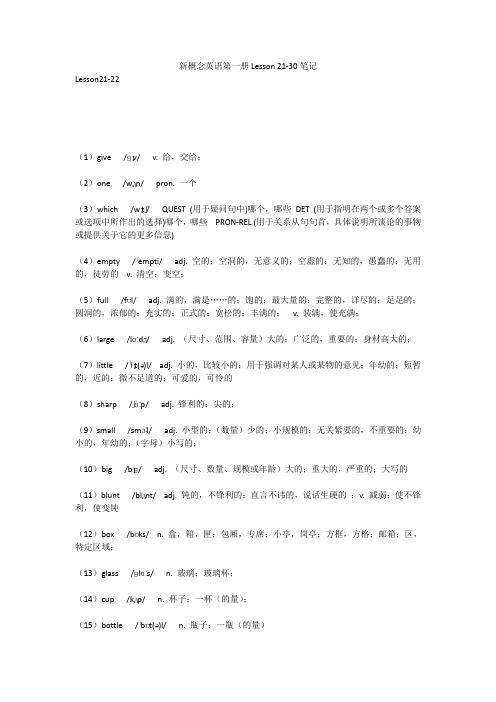
新概念英语第一册Lesson 21-30笔记Lesson21-22(1)give /ɡɪv/ v. 给,交给;(2)one /wʌn/ pron. 一个(3)which /wɪtʃ/ QUEST (用于疑问句中)哪个,哪些DET (用于指明在两个或多个答案或选项中所作出的选择)哪个,哪些 PRON-REL (用于关系从句句首,具体说明所谈论的事物或提供关于它的更多信息)(4)empty /ˈempti/ adj. 空的;空洞的,无意义的;空虚的;无知的,愚蠢的;无用的,徒劳的 v. 清空;变空;(5)full /fʊl/ adj. 满的,满是……的;饱的;最大量的;完整的,详尽的;足足的;圆润的,浓郁的;充实的;正式的;宽松的;丰满的; v. 装满,使充满;(6)large /lɑːdʒ/ adj. (尺寸、范围、容量)大的;广泛的,重要的;身材高大的;(7)little /ˈlɪt(ə)l/ adj. 小的,比较小的;用于强调对某人或某物的意见;年幼的;短暂的,近的;微不足道的;可爱的,可怜的(8)sharp /ʃɑːp/ adj. 锋利的;尖的;(9)small /smɔːl/ adj. 小型的;(数量)少的;小规模的;无关紧要的,不重要的;幼小的,年幼的;(字母)小写的;(10)big /bɪɡ/ adj. (尺寸、数量、规模或年龄)大的;重大的,严重的;大写的(11)blunt /blʌnt/ adj. 钝的,不锋利的;直言不讳的,说话生硬的;v. 减弱;使不锋利,使变钝(12)box /bɒks/ n. 盒,箱,匣;包厢,专席;小亭,岗亭;方框,方格;邮箱;区,特定区域;(13)glass /ɡlɑːs/ n. 玻璃;玻璃杯;(14)cup /kʌp/ n. 杯子;一杯(的量);(15)bottle /ˈbɒt(ə)l/ n. 瓶子;一瓶(的量)(16)tin /tɪn/ n. <英>罐,罐头盒;(17)knife /naɪf/ n. 餐刀;刀子,刀具,匕首;手术刀(18)fork /fɔːk/ n. 餐叉,叉子;(19)spoon /spuːn/ n. 匙,勺子;2、文章和语法(1)Give me a book, please这个句子的完整形式是You give me a book 是主谓宾宾的结构此处give后面跟的是双宾语me 和book 。
新概念英语第一册听课笔记第21课

新概念英语第一册听课笔记第21 课Lesson 21 Which book?give v. 给one pron. 一个which question word 哪一个empty adj.空的full adj. 满的large adj. 大的little adj. 小的sharp adj. 尖的,锋利的small adj. 小的big adj. 大的blunt adj. 钝的box n.盒子glass n. 杯子cup n. 茶杯bottle n. 瓶子tin n. 罐头knife n.刀子fork n. 叉子spoon n. 勺子give 给,它的主语能够是人,也能够是物:Teaching gives me a lot of pleasure.give sb. sth.give sth. to sb.Give me a pen please. 请给我一支钢笔。
Give a pen to me please.offer 提供,只能是人做主语provide 免费提供supply 供应donate 捐献con tribute 贡献:I have con tributed all my life toteaching career.★ TextGive me a book please, Jane.Which book?This one?No, not that one. The red one.This one?Yes, please.Here you are.Thank you.Lesson 21 Which book? 哪一本书?give v. 给one pron. 一个which question word 哪一个Less on 22 Give me / him/her / us/them a … Which one?给我/他/ 她/他们一…哪一个?empty adj. 空的box(boxes)n. 盒子,箱子full adj. 满的glass (glasses )n. 杯子large adj. 大的cup(cups)n. 茶杯小的bottle (bottles )n. 瓶子little adj.sharp adj. 尖的,锋利的tin (tins )n. 罐头small adj. 小的knife (kinves )n. 刀子big adj. 大的fork (forks )n. 叉子blunt adj. 钝的spoon (spoons)n. 勺子Lesson 23 Which glasses? 哪几只杯子?on prep. 在之上shelf n. 架子,搁板Less on 24 Give me / him/her / us/them some … Which ones?给我/他/ 她/他们一些…哪些?desk n. 课桌table n. 桌子plate n. 盘子cupboard n. 食橱cigarette n. 香烟television n. 电视机floor n. 地板dressing table 梳妆台magazine n. 杂志bed n. 床newspaper n. 报纸stereo n. 立体声音响。
新概念英语第一册课文翻译及学习笔记Lesson21_26
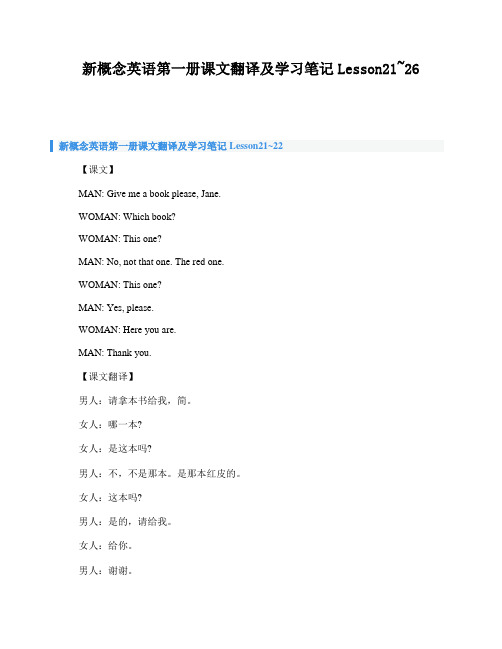
新概念英语第一册课文翻译及学习笔记Lesson21~26新概念英语第一册课文翻译及学习笔记Lesson21~22【课文】MAN: Give me a book please, Jane.WOMAN: Which book?WOMAN: This one?MAN: No, not that one. The red one.WOMAN: This one?MAN: Yes, please.WOMAN: Here you are.MAN: Thank you.【课文翻译】男人:请拿本书给我,简。
女人:哪一本?女人:是这本吗?男人:不,不是那本。
是那本红皮的。
女人:这本吗?男人:是的,请给我。
女人:给你。
男人:谢谢。
【生词】give v. 给one pron.一个which question word 哪一个【知识点讲解】1. 今天我们来学习一种新的句型:祈使句,Imperative Sentence 。
用于表达命令、请求、劝告、警告、禁止等的句子叫做祈使句。
祈使句的主语一般都省略,直接用动词原形开头。
比如课文中的:Give me a book please. 这里如果用完整的表达是You give a book please. 但除非是要强调You,一般很少这么表达。
再举几个例子:Be quiet, please. 或 Please be quiet. ——请安静。
在祈使句中please放在句首句尾都是可以的。
这里可以看到用到的是be动词原形。
Sit down, please. ——请坐下。
Look out! 或 Watch out! ——小心!2. which这个疑问词我们之前提到过,表示对确切物体的询问。
which和what的区别是:前者用于选择范围较小或较明确的场合,后者用于选择范围较大或不明确的场合。
比如:Which color is your car, black or white? 你的车是什么颜色?黑色或白色?(确切地在黑与白中间提问)What color is your car? 你的车是什么颜色的?(不确定是什么颜色,没有限制)另外课文当中的which one是which book的省略。
新概念英语第一册第21课Lesson21课文单词知识点

Lesson21MAN: Give me a book please, Jane. WOMAN: Which book? WOMAN: This one? MAN: No, not that one. The red one. WOMAN: This one? MAN: Yes, please. WOMAN: Here you are. MAN: Thank you. 男人:请拿本书给我,简。
女人:哪一本?女人:是这本吗?男人:不,不是那本。
是那本红皮的。
女人:这本吗?男人:是的,请给我。
女人:给你。
男人:谢谢。
【知识点讲解】1. 今天我们来学习一种新的句型:祈使句,Imperative Sentence 。
用于表达命令、请求、劝告、警告、禁止等的句子叫做祈使句。
祈使句的主语一般都省略,直接用动词原形开头。
比如课文中的:Give me a book please. 这里如果用完整的表达是You give a book please. 但除非是要强调You,一般很少这么表达。
再举几个例子:Be quiet, please. 或Please be quiet. ——请安静。
在祈使句中please放在句首句尾都是可以的。
这里可以看到用到的是be动词原形。
Sit down, please. ——请坐下。
Look out! 或Watch out! ——小心!2. which这个疑问词我们之前提到过,表示对确切物体的询问。
which和what 的区别是:前者用于选择范围较小或较明确的场合,后者用于选择范围较大或不明确的场合。
比如:Which color is your car, black or white? 你的车是什么颜色?黑色或白色?(确切地在黑与白中间提问)What color is your car? 你的车是什么颜色的?(不确定是什么颜色,没有限制)另外课文当中的which one是which book的省略。
新概念英语第一册第21课

★little
1.修饰有感情色 彩的东西,有 “可爱”的意思 my little son 2.强调数量时还 有否定的意思。 There is little water in the bottle.瓶子里没 有水。
★small
体积小,物理量 值的小 small eyes
★ glass
n. 杯子
tie is orange.
44页对话练习
book/(this blue)/that red Give me a book please. Which one? This blue one? No,not this blue one.That red one. Here you are. Thank you.
cup/(this dirty)/that clean Give me a cup please. Which one? This dirty one? No,not this dirty one.That clean one. Here you are. Thank you.
变成复数试试
Lesson 21 Which book? 哪一本书?
New words and expressions
give
[gɪv] v. 给 one [wʌn] pron. 一个 which [wɪtʃ] question word 哪一个
★give
v. 给
把某物给某人 give sb. sth. give sth. to sb. 给我一支笔 Give me a pen.=Give a pen to me. 给某人买某物 buy sb. sth. buy sth. for sb. 他给我买了一本书。 He buys me a book.=He buys a book for me.
新概念英语 lesson21

☆mad adj. 发疯
be mad/crazy about:为……而疯狂 为 而疯狂
to go mad 发狂
Don't fight with him, he is a mad man. 别跟他打架, 他是疯子。 别跟他打架 他是疯子。
☆sum n.量【sʌm 】 大量:a great many/a great number of+可数名 词复数 a sum of:一笔 a large sum of:大量的, 喜欢跟钱连用 a large sum of money a large amount of:许多 plenty of(注意:前面没 有a)足够的
☆determined adj. 【dɪ’tɜ:mɪnd 】 坚定的,坚决的,决意的 be determined by...由…决定 I haven't determined yet. 我还没有决定呢。
reason [’ri:zәn] n.原因
for this reason:由于这个原因 For what reason? 是为了什麽 some reason:由于某种原因 some+可数名词单数:某一 some book some+可数名词复数:一些 some books some+不可数名词:一些 some water
Thank You~!
被动语态的用法: 一、 被动语态的用法:
1. 一般现在时的被动语态构成:is / am / are + 及物动词的过 一般现在时的被动语态构成: 去分词 2. 一般过去时的被动语态构成:was / were + 及物动词的过 一般过去时的被动语态构成: 去分词 3. 现在完成时的被动语态构成:has / have + been + 及物动 现在完成时的被动语态构成: 词的过去分词 4. 一般将来时的被动语态构成:will+ be + 及物动词的过去分 一般将来时的被动语态构成: 词 A new hospital will be built in our city. 5. 含有情态动词的被动语态构成:情态动词 be + 及物动词的 含有情态动词的被动语态构成:情态动词+ 过去分词 6. 现在进行时的被动语态构成:am / is / are + being + 及物 现在进行时的被动语态构成: 动词的过去分词 7. 不定式的被动语态:to + be + 及物动词的过去分词 不定式的被动语态:
新概念一册21课
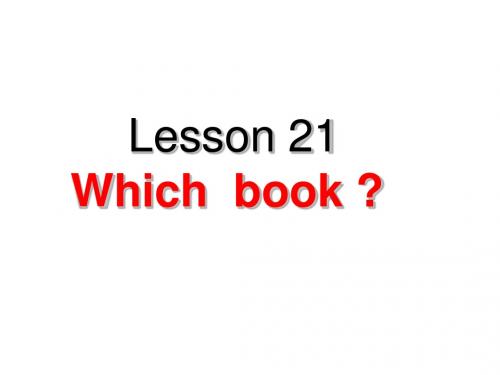
• box [bɔks] n.盒子
glass [glɑ:s] n.
杯子
• glass杯子,注意,glass只能表示玻璃杯, glass变为复数形式时后面加es,变成 glasses • glasses可以表示眼镜 • a pair of glasses 一副眼镜
cup [kʌp] n. 茶杯
• full一般与of连用,eg. the cup is full of water. • 当然,full不仅仅表示某种容器满了,还可 以表达很多其他意思。
★large adj. 大的 ★big adj. 大的 large仅指物理量值的大,主要指体积、面积、形状、 数量方面的大,修饰人时指个子大。 eg.David is a large boy. I hav指不仅体积大而 且很重,在修饰人时,主要指大人物,但个子未必高大。 eg.Jessie is very big in the Evergreen education. Jessie在常青藤教育里是个响当当的人物。 注意:big几乎涵盖了large所有的意思,当big修饰人 的时候主要是指大人物,但个子未必会很高。
empty ['empti] adj. 空的 full [ful] adj. 满的 large [lɑ:dʒ] adj. 大的 little ['litl] adj. 小的 sharp [ʃɑ:p] adj. 锋利的 small [smɔ:l] adj. 小的 big [big] adj. 大的 blunt [blʌnt] adj. 钝的
★little adj. 小的 ★small adj. 小的 small指物理量值的小或少,是large的反义词,不带 什么感情色彩
little也表示小或少,但有小而可爱的感情色彩,是 big的反义词。
新概念第一册lesson21

间接宾语
give sb. sth.
直接宾语
他给了我一支钢笔。
He gives me a pen. give sb. sth. He gives a pen to me. 他给了我一支钢笔. to me用来说明“给”这个动作
give sth. to sb.
但若要先说出直接宾语(事物),后说间接宾语 (人), 则要借助于介词to 或for
Which book?
MAN: Give me a book please, Jane. WOMAN: Which book?This one? MAN: No, not that one. The red one. WOMAN: This one? MAN: Yes, please. WOMAN: Here you are. MAN: Thank you.
❖ 主谓宾(双宾)句型
❖ 主谓宾(双宾)句型双宾动词:英语中可 以接两个不是并列关系、不是同位关系、 也不是逻辑主谓关系的名词短语做宾语的 动词叫双宾语及物动词,简称为“双宾动 词”。
❖ 双宾结构: ❖ 主语+及物谓语动词+间接宾语(人)+直接
宾语(事物)
full-empty
Unit 11
3
1
2
❖ give v. 给
❖ give up 放弃 give in 屈服 give a talk 作一次演讲 receive v. 收到
❖ someone 有人 anyone 任何人
it, one, that 它们三词均作代词用,指代前 文提到的名词。
it所指是同名同物,one和that所指是同名异 物,It 和that都可以指代上文的一部分或全 句,而one不能。
新概念英语L1辅导讲义Lesson21Madornot?教师版

新概念英语L1辅导讲义Lesson21Madornot?教师版Lesson 21 Mad or not?阅读理解1. Why do people think the writer is mad?Because the writer has been offered much money to go away, but he is determined to stay here.2. What must have been the reason why so many people left their homes?They must have been driven away from their homes by the noise.单词详解1. mad adj. 发疯的词组:go mad / be mad 发疯,失去理智drive sb. mad 把某人逼疯趣味引申:madhouse / funny farm 疯人院2. reason n. 理由结构:reason for sth./ to do sth./ why+句子翻译:那就是为什么我会迟到的原因。
That’s the reason for my lateness / why I was late.派生:reasonable adj. 合理的3. sum n. 量词组:a large sum of money 一大笔钱v. 概括,总结词组:to sum up 总而言之4. determined adj. 坚定的,下定决心的结构:be determined to do sth. 下定决心做某事同义词组:decide to do sth. / make up one’s mind to do sth. / make a decision to do sth.课文解析1. Aeroplanes are slowly driving me mad.●单词:slowly adv. 逐渐地翻译:他正在逐渐制定一个合理的计划。
新概念英语第一册第21课听课笔记

新概念英语第一册听课笔记-第21课Lesson 21 Which book?give v. 给one pron. 一个which question word 哪一个empty adj. 空的full adj. 满的large adj. 大的little adj. 小的sharp adj. 尖的,锋利的small adj. 小的big adj. 大的blunt adj. 钝的box n. 盒子glass n. 杯子cup n. 茶杯bottle n. 瓶子tin n. 罐头knife n. 刀子fork n. 叉子spoon n. 勺子give 给,它的主语可以是人,也可以是物:Teaching gives me a lot of pleasure.give sb. sth.give sth. to sb.Give me a pen please. 请给我一支钢笔。
Give a pen to me please.offer 提供,只能是人做主语provide 免费提供supply 供应donate 捐献contribute 贡献:I have contributed all my life to teaching career.★TextGive me a book please, Jane.Which book?This one?No, not that one. The red one.This one?Y es, please.Here you are.Thank you.Lesson 21 Which book? 哪一本书?give v. 给one pron. 一个which question word 哪一个Lesson 22 Give me/him/her/us/them a…Which one?给我/他/她/他们一…哪一个?empty adj. 空的box(boxes)n. 盒子,箱子full adj. 满的glass(glasses)n. 杯子large adj. 大的cup(cups)n. 茶杯little adj. 小的bottle(bottles)n. 瓶子sharp adj. 尖的,锋利的tin(tins)n. 罐头small adj. 小的knife(kinves)n. 刀子big adj. 大的fork(forks)n. 叉子blunt adj. 钝的spoon(spoons)n. 勺子Lesson 23 Which glasses? 哪几只杯子?on prep. 在……之上shelf n. 架子,搁板Lesson 24 Give me/him/her/us/them some…Which ones?给我/他/她/他们一些…哪些?desk n. 课桌table n. 桌子plate n. 盘子cupboard n. 食橱cigarette n. 香烟television n. 电视机floor n. 地板dressing table 梳妆台magazine n. 杂志bed n. 床newspaper n. 报纸stereo n. 立体声音响。
新概念一笔记21-30课
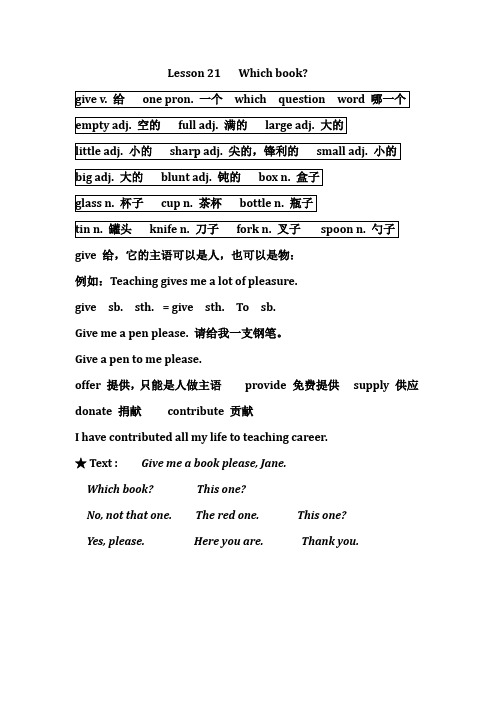
Lesson 21 Which book?give 给,它的主语可以是人,也可以是物:例如:Teaching gives me a lot of pleasure.give sb. sth. = give sth. To sb.Give me a pen please. 请给我一支钢笔。
Give a pen to me please.offer 提供,只能是人做主语provide 免费提供supply 供应donate 捐献contribute 贡献I have contributed all my life to teaching career.★ Text :Give me a book please, Jane.Which book? This one?No, not that one. The red one. This one?Yes, please. Here you are. Thank you.Lesson 22 Give me / him / her / us / them a…Which one?Written exercises 书面练习B1.Cup/ this dirty/ that cleanGive me a cup please. Which one? This dirty one? No, not this dirty one. That clean one.Here you are. Thank you.2.glass/ this empty/ that full3.bottle/ this large/ that small4.box/ this big/ that little5.tin/ this new/ that old6.knife/ this sharp/ that blunt7.spoon/ this new/ that old8.fork/ this large/ that smallLesson 24 Give me/him/her/us/them some…big 它不仅指物理量的大小,还指精神方面的大小。
新概念英语第一册Lesson21-22笔记(语法点+配套练习+答案)

which colour哪个颜色
which book哪一本书
which one哪一个
Whichcolourdo you like, black or red?
I like black.
Give me a book, please.
Whichone?
full adj.满的
be full of充满...
Is this Helen's dog? No,it's not.Herdog is brown and white.
定语:修饰、限定名词
表语:放在系动词后
1. I'mfine. (表语)
2. He's atallboy. (定语)
3. The boyunder the treeis Steven. (定语)
4. These ice- creams arenice. (表语)
5. We arethirsty and tired. (表语)
6. Thatdirtycup is Emma's. (定语)
7. Thenewspoon is Tim's. (定语)
8. Thislargefork is on the table. (定语)
3.对定语提问用which
There are two books on the desk. Theoldbook is Bella’s. (对划线部分提问)
---I haveone, too. (代词)
Where did you buy this dress? I’d like to have one, too. (代词)
3.形容词的作用
adj.在“名词前”,做定语e.g. I have agreendress.
最新新概念第一册 lesson 21-22 知识点全析教学文稿精品课件
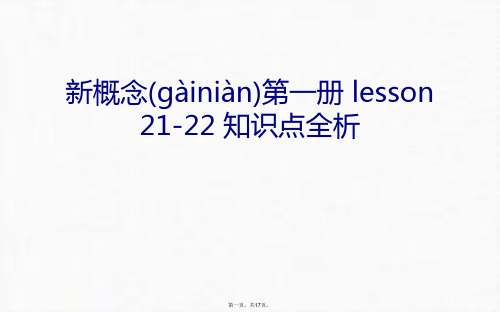
思考:one作为(zuòwéi)代词有 没有复数形式?
---Which shoes do you like? ---The yellow __o_n_e_s__.
第四页,共17页。
3.which 哪一个(yī ɡè); 哪一些 (yīxiē)
Which book? 哪本书?
Which tourists? 哪些
I’m all alone and the rooms are getting smaller.
寂静的夜,空荡的街,没有你身边(shēnbiān),心里对你的思恋一遍一遍。
连读:一辅一元,前辅后元,可拼读。
前面一个单词的最后一个字母如果是辅音(fǔyīn),比如an; 后面一个单词的第一个字母是元音,比如empty. 构成:an empty street, an empty house
This knife is very sharp. 这把刀很锋利
(fēnglì)。
9.blunt
adj. 钝的
The knife is blunt. 这把刀很钝。
My English is blunt. 我的英语(yīnɡ yǔ)
10.box (boxes)
不熟练。 n. 盒子,箱子
第九页,共17页。
第十七页,共17页。
第十一页,共17页。
三.句型讲解 宾
1.You give me a book.
主谓宾 ?
2.Not that one. =Not that book. The red one. =The red book.
第十二页,共17页。
四.语法讲解
1.可以接双宾语的动词。 give sb sth.
既可以(kěyǐ)跟人也可以(kěyǐ) 跟物的V
新概念英语1册lesson21(2)& 22 &25(1)学习笔记

Lesson 21 Which book? 哪一本书?练习:用what, who, how, whose, which对下划线部分进行提问.(特殊疑问句句变三部曲:1.根据意思确定特殊疑问词;2.特殊疑问词置于句首;3.把助动词提至主语前,即倒装)。
1.That one is my bag.→ Which one is your bag? (特殊疑问词对主语进行提问时不倒装!)2.This is a dog.→What is this?3.That is a car.→What is that?4.My hair is brown.→What color is your hair?5.Elaine is our teacher.→Who is Elaine?6.That is Mike’s car.→Whose car is that?7.Helen is well.→How is Helen?Lesson 22 Give me/him/her/us/them a…给我/他/她/我们/他们一……Which one?哪一……?单词讲解:empty 空的,空旷的,空虚的;e.g. an empty house/The street is empty./I feel empty.Full 满的;e.g. My cup is full/I am full.我饱了;用法记忆:be full of…. 充满…. ;E.g. The garden is full of flowers./The room is full of smoke.Fill 装满;用法记忆:be filled with…= be full of … e.g. The room is filled with smoke./The garden is filled with flowers. Large 大的(通常指尺寸大小);同义词:bigLittle 小的(有感情色彩);small 小的(通常指尺寸);用法记忆:a little 有一点;Sharp 锋利的,有尖的;e.g. The knife is sharp. 反义词:blunt钝的;Sharpen 削尖,磨快e.g. sharpen this pencil.Box 箱子,盒子;复数:boxes;另一个意思:拳击;boxer 拳击手;boxing 拳击运动;Glass 杯子,玻璃杯;e.g. a glass of water.;glasses 眼镜;Cup 茶杯,咖啡杯(热饮用的带把手的杯子);e.g. a cup of tea./a cup of coffee./the World Cup.世界杯。
新概念英语第一册Lesson 21 Which book
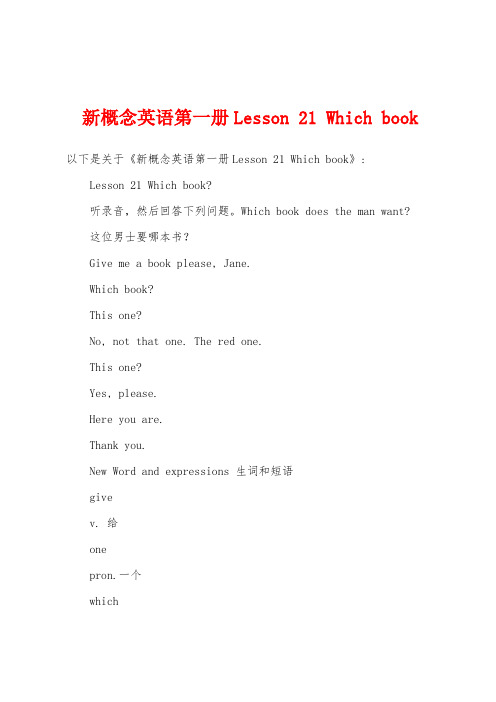
新概念英语第一册Lesson 21 Which book 以下是关于《新概念英语第一册Lesson 21 Which book》:Lesson 21 Which book?听录音,然后回答下列问题。
Which book does the man want?这位男士要哪本书?Give me a book please, Jane.Which book?This one?No, not that one. The red one.This one?Yes, please.Here you are.Thank you.New Word and expressions 生词和短语givev. 给onepron.一个whichquestion word 哪一个参考译文丈夫:请拿本书给我,简。
妻子:哪一本?妻子:是这本吗?丈夫:不,不是那本。
是那本红皮的。
妻子:这本吗?丈夫:是的,请给我。
妻子:给你。
丈夫:感谢。
自学导读1.Give me a book please, Jane.请拿本书给我,简。
这是一个祈使句。
祈使句表示恳求或命令。
(请参见Lessons 13~14语法局部的说明。
)表示客气的恳求时,通常加please。
2.Which book? 哪一本?是Which book do you want?的省略形式。
下文中的This one? 是Do you want this one?的省略形式。
No, not that one是No, I do not want that one的省略形式。
口语中常用这样的省略句。
3.This one?是这本吗?相当于:Do you want this one? one是不定代词,代替 a book,以避开重复。
one的复数形式是ones。
one和ones前面都可用定冠词,也可有自己的定语。
如:4.数字1,010,1,011,1,016的英文写法1,010----a thousand and ten1,011----a thousand and eleven1,016----a thousand and sixteen语法 Grammar in use1.人称代词代词,顾名思义,就是用来代替名词或名词短语的词,在已经知道所指的是谁或什么的状况下使用,以免行文重复。
新概念英语笔记-第一册(Lesson21-Lesson22)
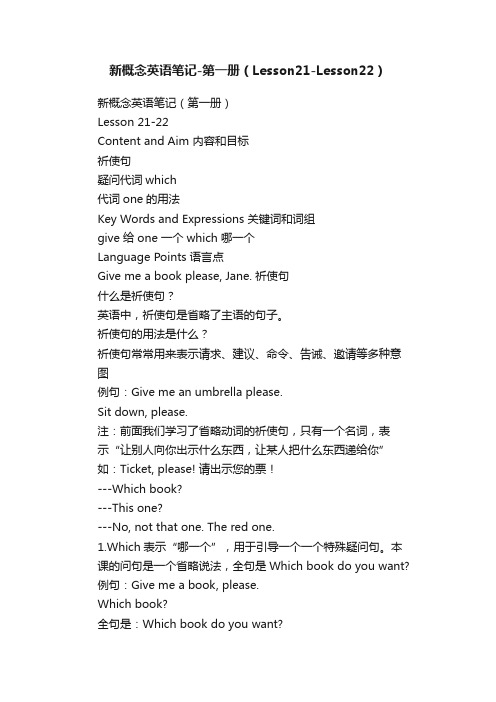
新概念英语笔记-第一册(Lesson21-Lesson22)新概念英语笔记(第一册)Lesson 21-22Content and Aim 内容和目标祈使句疑问代词which代词one的用法Key Words and Expressions 关键词和词组give 给one 一个which 哪一个Language Points 语言点Give me a book please, Jane. 祈使句什么是祈使句?英语中,祈使句是省略了主语的句子。
祈使句的用法是什么?祈使句常常用来表示请求、建议、命令、告诫、邀请等多种意图例句:Give me an umbrella please.Sit down, please.注:前面我们学习了省略动词的祈使句,只有一个名词,表示“让别人向你出示什么东西,让某人把什么东西递给你”如:Ticket, please! 请出示您的票!---Which book?---This one?---No, not that one. The red one.1.Which表示“哪一个”,用于引导一个一个特殊疑问句。
本课的问句是一个省略说法,全句是Which book do you want? 例句:Give me a book, please.Which book?全句是:Which book do you want?陈述句:I want the red book.2.英语中,One除了是数字“1”还是代词,意思是代替前面提到过的内容。
为了避免重复,常常在后面提到前面的内容时,代替前面的内容。
例:Give me a book, please? Which one?相当于Which book?(上一句提到book,这里再次问道“哪一本书”的时候就用one来代替前面的book)That one? 你要的是那本吗?This blue one? 你要的是这本蓝的吗?Patterns基本句型---Give me/him/her/us/them a…---Which one?---The…one. (确指的某一件东西,所以用了the)例句:---Give her a spoon please.---Which one?--- The small one.。
新概念第一册21-22课

it, one, that 它们三词均作代词用,指代前文提到的名词。
it 所指是同名同物; I like the car,
but I have no enough money to buy it.
one
pron. 一个
one 所指是同名异物; I like cars, but I can’t afford to buy one.
哪些游客?
Which tourists?
哪些游客来自于北京?
Which tourists are from Beijing?
empty adj. 空的; v. 倒空,使…变空
The bottle is empty now.
Empty the trash, please.
full adj. 满的
I drink a full glass of coffee. He got full marks for this answer. be full of 装满;充满
Give me a flower.
双宾动词
give sth. to sb. Give a flower to me. give up 放弃 My father gives up smoking. give in 屈服 His mother gives in and buys him a new bike. give a talk 作一次演讲 He will give us a talk tomorrow.
give sb. sth.
他给了我一支钢笔。 He gives me a pen.
give sb. sth.
He gives a pen to me. give sth.to sb.
to 用来说明“给”这个动作
新概念英语第一册lesson21-22(共65张PPT)

(2)a few, a little含肯定意味,few, little含 否定意味。
elbowfsmilbgkutasoghcfnbtlohnlormppuxliuaelivtegirogtnctrsfpakeyelepohtselln
a little 一点 同义短语:a few 一点
There is little water in the glass. 杯子里几乎没有水了。 There is a little water in the glass. 杯子里还有些水。
There are a few mistakes in this passage. 在 这篇文章里有些错误。
语言点
Here you are. 1.给你。 2.到站了。
M: ___ ___ ___ ___ ___,Jane. W:____ book? This___ ? M: No, ___ that one. The __ __. W: This one? M: Yes, please. W: ___ ___ ___. M: ____ ____.
Lesson21 Which book?
Lesson 22 Give me/him/her/us/them a… Which one?
What does the man let Jane give him? listen
词汇
Which 疑问词 哪一个? Which one? 哪个?
which is your book? which one do you like best? 复习疑问词:
但注意:只能代替可数名词。 指代复数用ones.
- 1、下载文档前请自行甄别文档内容的完整性,平台不提供额外的编辑、内容补充、找答案等附加服务。
- 2、"仅部分预览"的文档,不可在线预览部分如存在完整性等问题,可反馈申请退款(可完整预览的文档不适用该条件!)。
- 3、如文档侵犯您的权益,请联系客服反馈,我们会尽快为您处理(人工客服工作时间:9:00-18:30)。
Lesson21
MAN: Give me a book please, Jane. WOMAN: Which book? WOMAN: This one? MAN: No, not that one. The red one. WOMAN: This one? MAN: Yes, please. WOMAN: Here you are. MAN: Thank you. 男人:请拿本书给我,简。
女人:哪一本?
女人:是这本吗?
男人:不,不是那本。
是那本红皮的。
女人:这本吗?
男人:是的,请给我。
女人:给你。
男人:谢谢。
【知识点讲解】
1. 今天我们来学习一种新的句型:祈使句,Imperative Sentence 。
用于表达命令、请求、劝告、警告、禁止等的句子叫做祈使句。
祈使句的主语一般都省略,直接用动词原形开头。
比如课文中的:
Give me a book please. 这里如果用完整的表达是You give a book please. 但除非是要强调You,一般很少这么表达。
再举几个例子:
Be quiet, please. 或Please be quiet. ——请安静。
在祈使句中please放在句首句尾都是可以的。
这里可以看到用到的是be动词原形。
Sit down, please. ——请坐下。
Look out! 或Watch out! ——小心!
2. which这个疑问词我们之前提到过,表示对确切物体的询问。
which和what 的区别是:前者用于选择范围较小或较明确的场合,后者用于选择范围较大或不明确的场合。
比如:
Which color is your car, black or white? 你的车是什么颜色?黑色或白色?(确切地在黑与白中间提问)
What color is your car? 你的车是什么颜色的?(不确定是什么颜色,没有限制)
另外课文当中的which one是which book的省略。
3. 回复别人的请求,特别是当对方提供什么东西给你时,愿意用Yes, please; 不愿意用No, thanks. 这是约定俗成、也很礼貌的说法。
比如:
Do you want another cup of tea? 你想再来杯茶吗?
Yes, please./ No, thanks. 好的,请给我吧。
/ 不了,谢谢。
